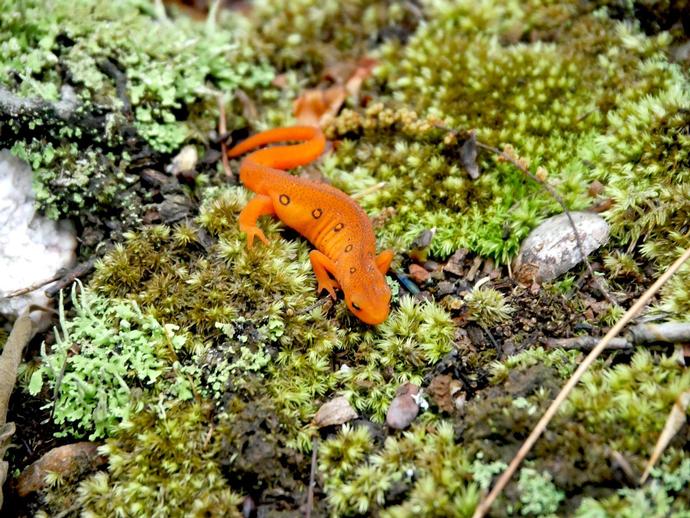March 3, 2021
Ben here with today's #BenInNature update presented by our friends at Carter Bank & Trust!
This week, we're looking at some of my favorite never-before-seen photos of critters we've looked at previously. Today's pick: the eastern newt (Notophthalmus viridescens), one of the most photogenic little critters you're liable to find out in the woods here in southwest Virginia!
This particular eastern newt is in the "red eft" stage of life, which is when these newts are easiest to find. If you go out into the woods in the spring or summer shortly after a rainstorm and keep your eyes on the ground, you're pretty likely to spot one!
These newts have quite an unusual life cycle. They begin their lives as aquatic larvae, and after a few months, they shed their gills, turn bright orange, and move onto dry land. This is the "red eft" stage like the newt in the photograph. For the next two or three years, they wander the Earth seeking out a brand new pond to call home. Once they find a good one, their colors fade to a dull olive, they grow wide paddle-like tales, and they become aquatic adults!
Another remarkable fact about eastern newts is that they're always able to find their home pond. Their secret? They have a built-in compass! Studies have shown that through a combination of detecting the sun's position and detecting magnetic fields, eastern newts can always find their way home.
ABOUT #BenInNature
Social distancing can be difficult, but it presents a great opportunity to become reacquainted with nature. In this series of posts, Administrator of Science Ben Williams ventures outdoors to record a snapshot of the unique sights that can be found in the natural world. New updates are posted Monday - Friday, with previous posts highlighted on the weekends. This series of posts is made possible thanks to the support of VMNH Corporate Partner Carter Bank & Trust (www.cbtcares.com)
NATURE PHOTO IDENTIFICATIONS
If you discover something in nature that you would like help identifying, be sure to message us right here on Facebook with a picture (please include location and date of picture) and we'll have our experts help you identify it!

 Hours & Admissions
Hours & Admissions Directions
Directions

